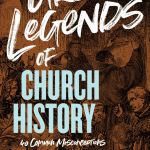
But what about Ephesians 5?
Ephesians 5 is (in?)famous for Paul’s exhortation to husbands and wives. Here we read that women must submit themselves to their husbands and husbands must sacrifice themselves for their wives. He also includes instructions on how to live honorably with children and household slaves. Understanding these instructions requires at least a brief introduction to the culture of the day. This post and this post provide excellent history on the “household codes” prevalent in first-century Ephesus.
The basics: men ruled their households, which included wife, children, and slaves. They were the undisputed authority in their homes, which often resembled a small business. Social order depended upon order at home. Marriages at that time actually did more closely resemble a S/V relationship, with men holding the social, financial, legal powers. In Ephesians 5, Paul turned cultural practice on its head by commanding the husbands to sacrifice themselves and enable/encourage their wives to flourish. This was radical, very different from the usual “be in charge” reality.
Paul also instructed wives to submit themselves. This was nothing new, but now in Christ a wife could do so with a healthy, godly attitude. They could submit “in the Lord,” that is, according to their consciences, showing respect rather than begrudging obedience.
[My group’s affirmation of male authority did not parallel all the elements of a S/V covenant so much as innately reiterate a particular understanding of the word kephale, translated as head, which appears in several New Testament passages relating to men and women. Some scholars believe it means authority, while some say it means source (both are legitimate, depending on context), while others point to its use as a metaphor. And while that discussion is likely the underlying assumption that steered the conversation, it’s best left to another post. I point you to this and this for an excellent study of kephale.]So what about covenants today?
I believe that many in the church largely ignore the context of Ephesians 5 while advocating for the “roles” apparent within the passage: women submit, therefore men lead. Except, the actual wording is: women submit themselves, and men sacrifice themselves. The word “submit” fools the modern reader into thinking marriage includes a power arrangement. As a whole, Paul echoes the creation narrative by encouraging oneness! Mutual submission, mutual encouragement, mutual lifting up of the other. Love and respect flow from both to both.
So, no, marriage as God intended it does not resemble any sort of suzerain/vassal covenant. None of the markers are there. God’s design for marriage was established in the Garden where:
- neither the man nor the woman had authority over the other (see 1 Corinthians 7:4),
- loyalty went both ways (not just the woman to the man),
- the purpose for the union was oneness, not a conditional exchange of favors (if you do this, I’ll do that)
- they shared responsibility for the land,
- both were limited to one partner—no man/suzerain would be allowed to covenant with other women/vassals. Marriage was meant to be between one man and one woman (and yes, polygamy was a result of the fall).
Christian marriage is a covenant between two redeemed sinners, pledging before God to be faithful to one another. In the strength of the Holy Spirit, let’s join forces with our spouse so that his and her strengths are magnified, weaknesses covered, sins forgiven, with both given room to flourish in every aspect of life.
Together. As one.
















